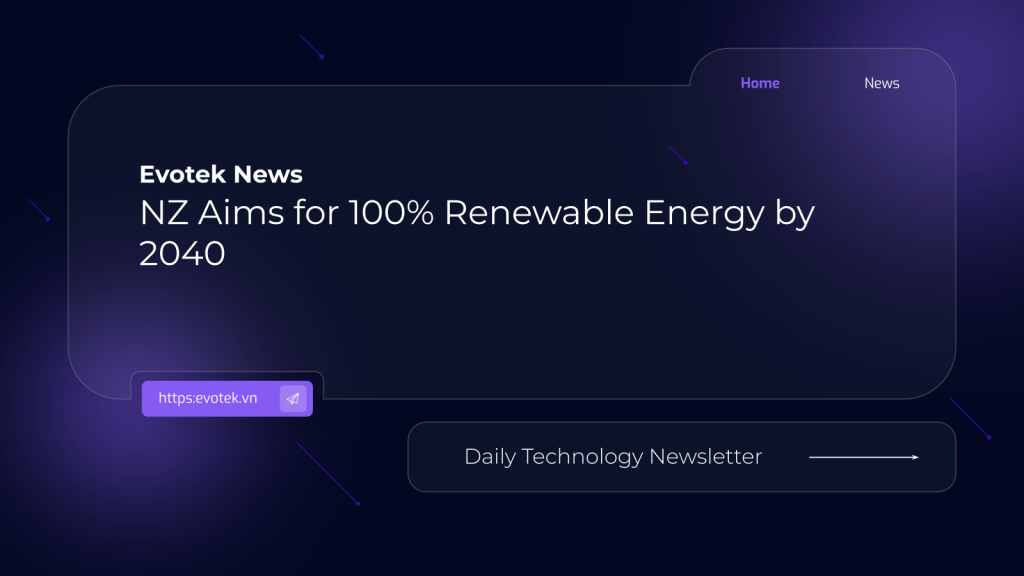New Zealand is making significant strides towards a sustainable future, with the Electricity Authority projecting a 100% renewable electricity grid by 2040. This ambitious goal positions New Zealand as a global leader in clean energy.
Currently, New Zealand’s energy landscape is dominated by four major players: Meridian, Contact, Genesis, and Mercury. The Electricity Authority emphasizes the need for increased investment in renewable generation to meet growing demand and replace aging thermal power plants. This transition requires a strategic approach to balance energy supply and environmental responsibility.

New Zealand projects to be 100% renewable by 2040. Graph courtesy Meridian Energy.
Meridian, a key player focused on renewables, highlights the challenges of relying heavily on hydropower (60% of electricity). Recent droughts and excessive rainfall have tested the country’s energy resilience. Despite these challenges, national storage levels remain within normal ranges, providing a buffer for approximately 15 weeks of generation.
However, regulations and consent restrictions can limit the utilization of available hydro resources, even in emergencies. Streamlining these regulations could unlock additional renewable energy potential at a lower cost. Transpower, the national grid owner and system operator, is urged to enhance South Island storage capacity for improved energy security.

Benmore Power Station. Photo courtesy Meridian Energy.
Over NZ$10 billion has been invested in New Zealand’s renewable energy sector in the past 15 years, increasing renewable energy penetration from 65% to 88% under normal conditions. This investment is largely driven by economic factors, demonstrating the increasing competitiveness of renewable energy sources. Neal Barclay, Meridian’s Chief Executive, expects demand growth from electrification to further incentivize investment, noting that even during recent droughts, less thermal fuel was burned than in previous years.
The rise of electric vehicles (EVs) will contribute significantly to this demand growth. Despite a market dip following government changes, EV sales are recovering, reaching a penetration rate of around 15% in February. New Zealand aims to become a leader in EV adoption, mirroring the success of countries like Norway.

Te Apiti, turbines with sheep and green grass. Photo courtesy Meridian Energy.
Meridian is actively supporting the transition to EVs, with a 100% electric light passenger vehicle fleet and plans for a nationwide charging network called Zero. This network aims to support zero-emission vehicles across the country.
By 2021, Meridian achieved a fully-electric fleet, demonstrating the feasibility of electrifying diverse vehicle fleets. Overcoming challenges such as remote worker charging and cultural preferences for certain vehicle types required innovative solutions like home-based charging infrastructure.
Currently, Meridian is tackling complex charging challenges in remote areas like Springs Junction. Their efforts demonstrate a commitment to comprehensive EV infrastructure development.
Data from Meridian’s half-year results show that New Zealand enjoys competitive electricity prices, strong energy security, and leadership in sustainability. The country added 5.5 TWh of new electricity generation projects between 2022 and 2023, with Meridian planning to add another 2 TWh in the near future.

Waitaki Power Station. Photo courtesy Meridian Energy.
Concept Consulting’s Generation Investment Survey indicates a significant increase in potential annual output from new developments, rising from 2,600 GWh to nearly 5,000 GWh. Wind and solar projects are expected to contribute significantly, with an annual generation capability increasing from 12,700 GWh to 20,800 GWh within the next three years. Battery storage is also gaining traction.
Challenges remain, including predicting demand-led growth, streamlining approval processes, and addressing community concerns. The rising costs for equipment and labor, compounded by a soft $NZ, also pose challenges for developers.
Overall, New Zealand is well-positioned to achieve its 100% renewable energy goal by 2040. The country’s strategic investments, innovative solutions, and commitment to sustainability make it a model for other nations to follow in the global transition to a low-carbon future.

Ohau C — part of the Waitaki hydro scheme. Photo courtesy Meridian Energy.
While New Zealand leverages its abundant hydro resources, countries like Australia face ongoing debates about renewable energy versus nuclear power. Regardless of the approach, the future is undoubtedly bright and electric.
David Waterworth is a retired teacher passionate about cleantech and sustainable solutions.

 日本語
日本語 한국어
한국어 Tiếng Việt
Tiếng Việt 简体中文
简体中文